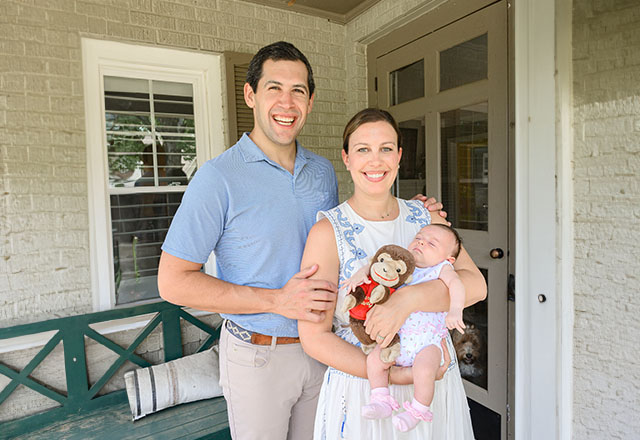Eli's Story
Giving Back

Eli’s memories of December 1993 and his diagnosis with cancer at age 2 are faint. It’s difficult for him to distinguish his own memories from the stories others have told him.
Photo by Harry Connolly
“I know I had acute lymphocytic leukemia, and I went through a few rounds of chemotherapy, but the extent of my medical knowledge stops right about there,” says Eli.
The few things he remembers are all good experiences — Orioles players visiting the pediatric oncology unit, playing in the game room and picking out toys from the treasure chest.
He considers himself fortunate in that regard and also because he has no lasting side effects from his cancer treatments.
Still, surviving cancer changed Eli’s life in a unique way. It inspired him to want to give back to the people who saved his life, he says.
“I don’t think I could have been in better hands than the doctors at Hopkins. Whether I realized it at the time, I think growing up in Baltimore you understand just how much respect there is for the doctors and nurses and work done at Hopkins,” says Eli. “Looking back, it definitely had a profound impact on putting me on this philanthropic path and finding my way to continue to support Hopkins.”
When he was 12, Eli started Cartridges for a Cure, a program that collected and recycled used printer cartridges to raise money for pediatric cancer research at the Johns Hopkins Kimmel Cancer Center. He raised nearly $100,000 through the program, and earned an additional $50,000 donation as a winner of the Volvo Hero Award.
Charitable giving remained a focus for Eli, and when he graduated from college, he worked for a nonprofit foundation, helping to develop grant-making strategies.
 Eli with his family
Eli with his familyHe went on to earn an MBA from Duke University, and his career path shifted. Currently, he is director of corporate strategy for a national home improvement chain.
His cancer experience intersected with his studies while he was at Duke. Eli visited one of his doctors, Michael Kastan, now executive director of the Duke Cancer Institute, who treated him nearly three decades earlier at Johns Hopkins.
“I walked into his office, and front and center behind his desk was a picture of him treating me at age 3 or 4. He has a stethoscope, and I’m sitting on my mom’s knee,” says Eli. “It was great connecting with him after 25, almost 30 years.”
Eli’s career path is not the only thing that has changed for him since fighting cancer as a toddler. Today, the 32-year-old is married to Jayme, and they are parents to Nora, born earlier this year.
“With my little one, I think I’ve definitely gained a newfound appreciation of how difficult it must have been for my parents,” says Eli.
He admires them for providing him with stability and optimism throughout his treatment and survivorship.
“I think it had a profound impact on me, and now, looking at Nora, I can’t imagine how difficult it must be for parents and siblings in this incredibly difficult situation, to be able to communicate to young patients that everything’s going to be OK,” he says.
As a young father, Eli hopes he will never need it, but he is comforted knowing a place like Johns Hopkins exists. He says, “There is no other place in the world I’d want my kid to be treated.”
For Clinicians Clinical Connection
Clinicians, discover the latest in research and clinical innovation from Johns Hopkins experts. Access educational videos, articles, CME courses and other resources from our world-renowned institution.
